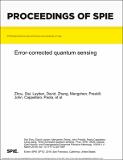Error-corrected quantum sensing
Author(s)
Zhou, Sisi; Layden, David; Zhang, Mengzhen; Preskill, John; Cappellaro, Paola; Jiang, Liang; ... Show more Show less
DownloadPublished version (571.9Kb)
Publisher Policy
Publisher Policy
Article is made available in accordance with the publisher's policy and may be subject to US copyright law. Please refer to the publisher's site for terms of use.
Terms of use
Metadata
Show full item recordAbstract
Quantum metrology has many important applications in science and technology, ranging from frequency spectroscopy to gravitational wave detection. Quantum mechanics imposes a fundamental limit on measurement precision, called the Heisenberg limit, which can be achieved for noiseless quantum systems, but is not achievable in general for systems subject to noise. Here we study how measurement precision can be enhanced through quantum error correction, a general method for protecting a quantum system from the damaging effects of noise. We find a necessary and sufficient condition for achieving the Heisenberg limit using quantum probes subject to Markovian noise, assuming that noiseless ancilla systems are available, and that fast, accurate quantum processing can be performed. When the sufficient condition is satisfied, the quantum error-correcting code achieving the best possible precision can be found by solving a semidefinite program. We also show that noiseless ancilla are not needed when the signal Hamiltonian and the error operators commute. Finally we provide two explicit, archetypal examples of quantum sensors: qubits undergoing dephasing and a lossy bosonic mode.
Date issued
2019-03Department
Massachusetts Institute of Technology. Department of Nuclear Science and EngineeringJournal
Proceedings of the Society of Photo-optical Instrumentation Engineers
Publisher
Society of Photo-Optical Instrumentation Engineers (SPIE)
Citation
Zhou, Sisi et al. "Error-corrected quantum sensing." Proceedings Volume 10934, Optical, Opto-Atomic, and Entanglement-Enhanced Precision Metrology, February 2019, San Francisco, USA, edited by Selim M. Shahriar and Jacob Scheuer for SPIE, 2019. © 2019 SPIE
Version: Final published version
ISSN
0277-786X